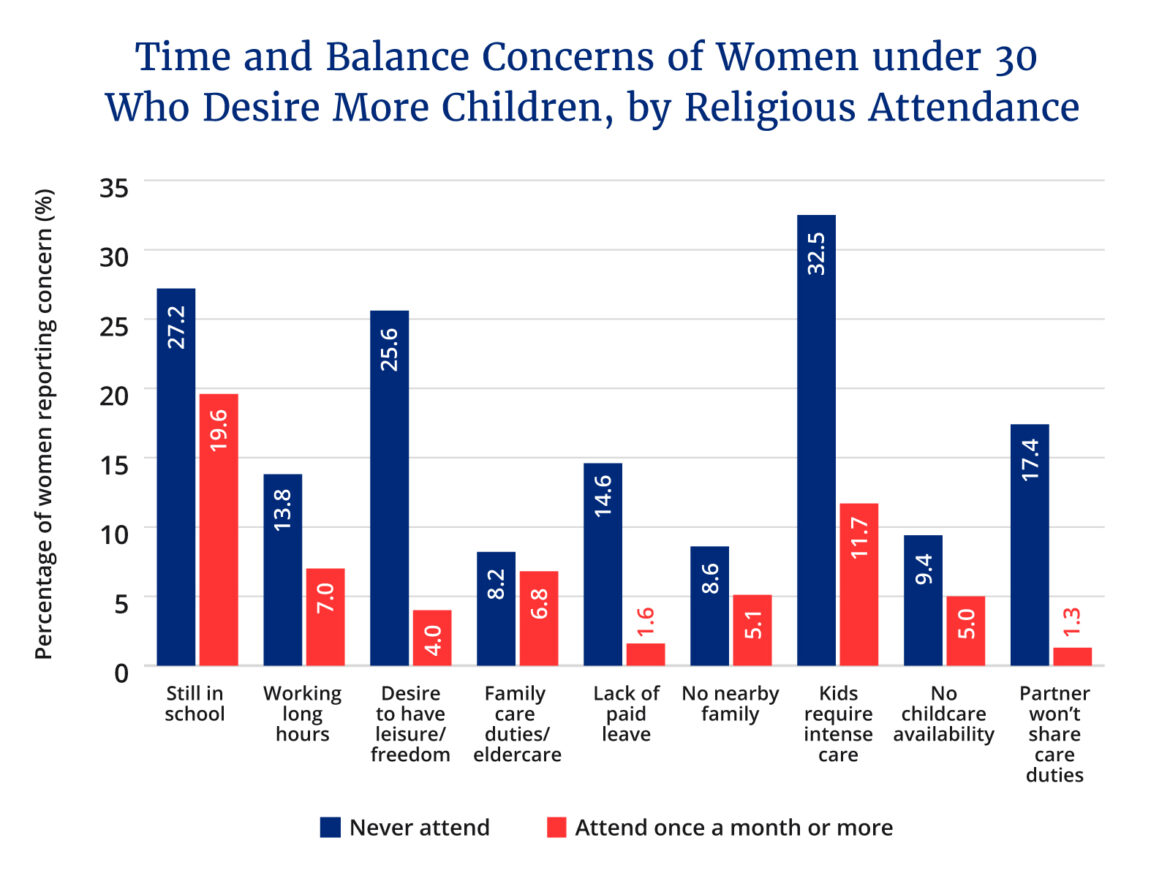- Religious women in Canada are having more children than non-religious women and report less anxiety about childbearing and parenthood, according to a new report from Cardus.
- Non-religious women under 30 report more than twice the amount of concern about financial obstacles to childbearing compared to women who regularly attend religious services.
- It could be that religion and the community that comes along with it, both do a good job of psychology preparing people for all of life's hardships, said Lyman Stone, the study's author.
Religious women in Canada are having more children than non-religious women and report less anxiety about childbearing and parenthood, according to a new study by the faith-based think tank Cardus.
In particular, non-religious women have serious concerns about the financial impact of having children and are far more skeptical that their partner will help with childcare than religious women the study finds.
“Even when religious and non-religious women have identical financial circumstances, they report dramatically different degrees of financial worries, suggesting that religious women possess additional non-financial resources, such as community support or psychological strategies, for managing their situation,” the report reads.

Even when controlling for other factors, like differences in income, the study finds that non-religious women under 30 report more than twice the amount of concern about financial obstacles to childbearing compared to women who regularly attend religious services.
“Being part of a community of shared values and mutual support that provides you with meaningful and powerful ways of thinking about and addressing the challenges in life has real benefit. That helps you achieve your goals in life,” Lyman Stone, a senior fellow at Cardus and the author of the study.
“But that’s not a silver bullet, right? We can’t just positive-think our way out of significant structural barriers to family life,” said Stone, who said he also supports government policies that help lighten the load, such as child benefit payments.
Stone said that it’s possible that religious women in Canada are simply getting more non-financial support from their community, such as child-minding, moral support, and items like hand-me-down clothing.
That could only be a partial explanation, because all women report similar levels of concern about these specific family-care duties, with the exception that non-religious women “are much more concerned that their partners will not share childcare responsibilities,” the study finds.
It could be that religion and the community that comes along with it, both do a good job of psychology preparing people for all of life’s hardships, said Stone.
The polling data finds that religion has three big effects on Canadians when it comes to family formation. Religious Canadians are more likely to desire larger families, to place a high social value on marriage and parenthood, and they also report benefiting from an extensive range of social support.
It’s not a silver bullet, though. Just like the rest of Canadian women, religious women are still having substantially fewer children than they would prefer.
A previous study by Cardus based on the same polling data found that Canadian women are having fewer children than they would prefer and, although religious women are having more children than non-religious women, they are still vastly under-shooting their preference.
Canadian women desire, on average 2.2 children, while Canada’s actual fertility rate sits at 1.4 children per woman. For comparison, the typical Protestant Canadian woman says she wants about three children. And although there are big differences among the various religious affiliations in Canada, they all desire more children than Canada’s current fertility rate of 1.4 children, even agnostics and atheists.

One thing that’s clear from the polling data is that the number of children a woman desires and intends to have rises in relation to the frequency she attends religious services.
Religious women are also more likely to be married and have more family-oriented dispositions, which also leads to larger family sizes. The study also points out that religious Canadians tend to marry earlier in life, meaning they simply have more time together during the years when conception is easiest.
It’s also the case that religion naturally creates a cultural incentive for families and children, which isn’t necessarily the case for the broader culture in Canada.
“Culture is a big part of it, norms, values, attitudes. So governments can think: are we feeding into public anxiety? Are we creating new sets of anxieties that wouldn’t have existed otherwise?” said Stone.
“There are a lot of other things that are adversely affected by a society where a growing share of people are just really anxious about a lot of things all the time. And so finding ways that our government or educational system can encourage stronger community support and greater mental and psycho-emotional resilience is a really important thing for all sorts of social outcomes, including fertility,” said Stone.
The report is based on a survey commissioned by Cardus with the Angus Reid Group in July 2022, which surveyed 2,700 women aged 18 to 44 about family and fertility.




